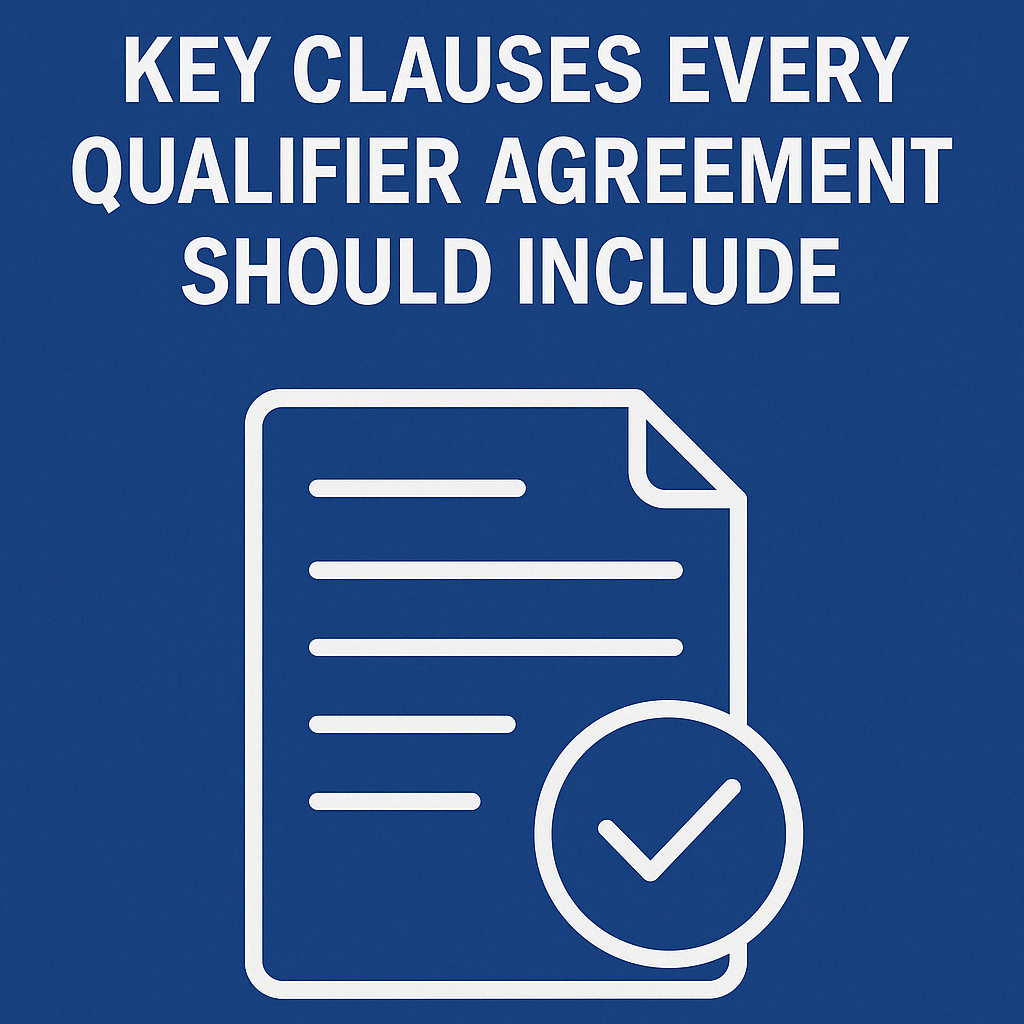What Florida Contractors and Business Owners Need to Protect Their Interests
In Florida’s construction industry, it’s common for a licensed contractor to qualify a company they don’t own. But too often, these arrangements are based on trust, a few emails, or a handshake—without a written agreement.
That’s risky for both sides.
A Qualifier Agreement isn’t just a formality. It’s a legal contract that protects the license holder (the qualifier) and the construction business they are qualifying. The right terms can help avoid disputes, clarify responsibilities, and limit liability.
Here are the core clauses every Qualifier Agreement should include—and why you should work with an attorney to get them right.
🧾 1. Compensation
How much is the qualifier being paid, and when? This clause should outline:
- The payment structure (flat fee, monthly retainer, per project, percentage, etc.)
- When payments are due
- What happens if payment is late or missed
This is often the first thing parties agree on—and the first thing they fight over when it’s not written down clearly.
🛡️ 2. Indemnification
This is one of the most important protections for the license holder. An indemnification clause addresses:
- Who is responsible if something goes wrong on a job
- Whether the company agrees to defend and hold the qualifier harmless from lawsuits, regulatory actions, or damages
These clauses should be carefully worded and tailored to the specific risks of the arrangement. A poorly written indemnification clause may offer little or no real protection.
👷♂️ 3. Supervision and Responsibility
Under Florida law, a qualifying agent may be held responsible for supervising construction activity—even if they’re not physically present. This clause should define:
- Whether the qualifier will be actively involved in operations or not
- What duties (if any) the qualifier will perform
- Who is responsible for jobsite activity, permits, and code compliance
This helps clarify expectations and manage legal risk—especially if the qualifier is not a company officer or employee.
📉 4. Limitation of Liability
If a customer sues the company or something goes wrong with a job, this clause can help limit the qualifier’s exposure. While indemnification covers third-party liability, a limitation of liability clause can restrict the scope and amount of potential claims between the parties themselves.
📑 5. Insurance Requirements
To minimize risk, the agreement should require the business to carry and maintain appropriate insurance, including:
- General liability coverage
- Workers’ compensation
- Any additional coverage required by DBPR or project contracts
It may also require the qualifier to be named as an additional insured, depending on the arrangement.
📆 6. Term and Termination
The agreement should specify:
- When it begins
- Whether it renews automatically or ends after a fixed term
- How either party can terminate the relationship (notice period, conditions, etc.)
- What happens if the business fails to comply with DBPR or licensing rules
This clause is critical to preventing situations where the qualifier wants out—but can’t, or doesn’t know how.
📣 7. Reporting and Notification Obligations
The qualifier may need certain information to stay compliant with state regulations. This clause should address:
- What the business must report to the qualifier (project list, jobsite details, violations, etc.)
- Who is responsible for filing required paperwork with DBPR or the Construction Industry Licensing Board (CILB)
- How notices will be sent between the parties
🔒 8. Confidentiality / Non-Disclosure
This clause protects sensitive information, trade secrets, or proprietary processes, particularly if the qualifier works with multiple companies or competitors.
🔚 9. Exit Obligations
If the relationship ends, the agreement should spell out:
- What happens to projects in progress
- Whether the qualifier must assist in transitioning the license
- How final payments or disputes will be resolved
👨⚖️ Why You Need Legal Counsel—Not a Template
These clauses aren’t just boilerplate. In Florida, a poorly drafted or incomplete Qualifier Agreement can:
- Expose the license holder to personal liability
- Lead to complaints with DBPR or disciplinary action by the CILB
- Result in costly disputes over payment, scope, or responsibility
At Douglas Law Firm, we regularly draft and review Qualifier Agreements tailored to the real-world needs of Florida contractors and construction businesses. We know how to protect both parties, comply with the law, and prevent legal surprises down the road.
📌 Final Thought
Whether you’re a licensed contractor or a business seeking a qualifier, don’t leave your license—or your business—vulnerable.
📞 Contact Douglas Law Firm today to have a Qualifier Agreement drafted or reviewed by an attorney who knows Florida contractor law.
FOR MORE INFORMATION SEE RELATED ARTICLES
